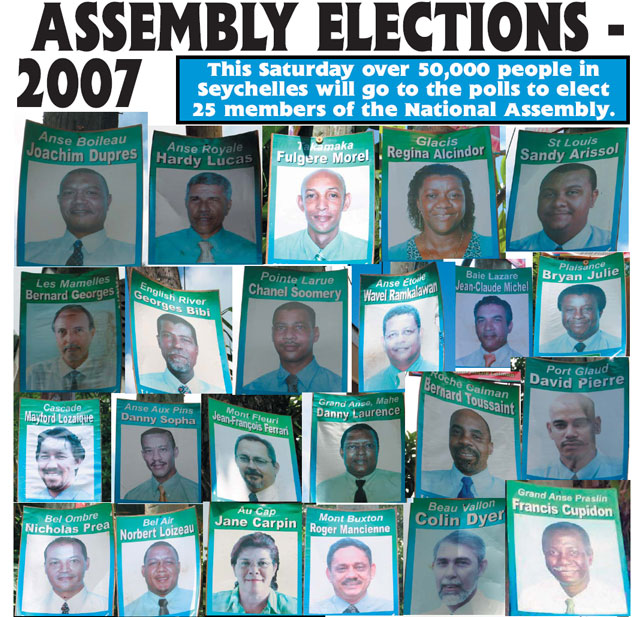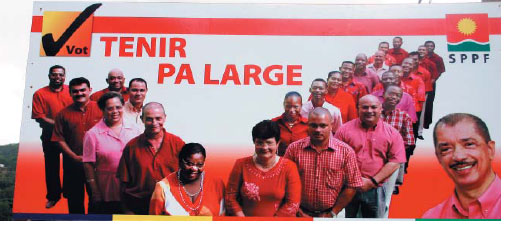


This Saturday over 50,000 people in
For the first time in 15 years since the current Constitution came into force, the choice is only between the combined opposition and the ruling group. There are neither independent candidates nor strictly speaking a third party. In this election all the candidates from the opposition are nominated by the Seychelles National Party (SNP) although four of the candidates come from the Democratic Party (DP).
For the SPPF, there is, for the first time a feeling that the party has lost its way despite well oiled machinery. There are many who feel that the leadership has been at a loss to find candidates to replace those they had selected with a lot of fanfare at their party congress last year but have since either abandoned the field or has been removed. Fourteen of them had to be replaced. SPPF also did away with many veteran members.
Unlike the presidential election of 2006, this year the campaign has been very low key, with the opposition deciding not to organise any outdoor rally. The SPPF, even with the advantage of government patronage, preferred not to take any risks, organising a rally on each island to galvanise their support base. Once again former President Albert Rene was rolled out for the occasion.
As usual the State broadcasting media provided no opportunity for debates on issues among the contenders or parties, in order that the electorate could have a better appreciation of the personal qualities of the candidates. Instead, each candidate was allowed seven minutes as well as one spot of one minute on television and two spots of seven minutes on the radio, to address their constituents in set piece fashion, reading from prepared texts. Meanwhile, the two political parties which nominated the candidates could make their own propaganda for half an hour in two segments, a shorter one at the beginning of the campaign and longer one at the end.

In their presentations, the opposition candidates concentrated on the shortcomings of the SPPF led government after 15 years in power, with proof of promises that have not been kept. The opposition also argued that democracy would be better served if the opposition had control or at least a strong representation in the Assembly since, the opposition say, SPPF MNAs cannot be seen to take issue with the government led by the Secretary General of their party.
Every SPPF candidate in their broadcast repeated the same party line - that they would be able to represent their constituents better than the opposition because they will have the ear of the government. This line of argument seemed to have not gone down well judging from the fire which the opposition attracted from the former president at the SPPF rallies. Few of the SPPF nominated candidates themselves were shown speaking to the crowd on the television news items covering the rallies.
Access to the state controlled media by President Michel, who was clearly heading the campaign for the SPPF party, was as blatant as in all the last presidential election. At the SPPF rally and for their special congress, SBC rolled out not only their most senior journalist – Mr Onezime, but also state of the art equipment and men power to cover the events. Mr Onezime in fact covered all the SPPF events exclusively. SBC also rolled out several cameras as well as the Outside Broadcast van to cover SPPF organised public events. Opposition events were covered by only one camera and without even a reporter there to observe the goings on.
Meanwhile, President Michel, who not only appeared on the posters of all the SPPF candidates, but also on every candidate’s broadcast, had unrestricted access to the State controlled media to make any statement he wished which was reported almost in its entirety, blurring even further the distinction between the State and the Party, an issue raised by every post-election report issued by the Commonwealth observers. Mr Michel chose the moment after the election had been announced with the only official voice of the opposition (the leader of the opposition in the National Assembly) effectively silenced by the dissolution to promote his “2017” vision, which was given wide publicity on the state broadcasting media and the government owned daily newspaper. It is not clear if the government paid for the sleek booklet but Michel was seen by everyone who tuned in to the state broadcasting media last Sunday brandishing the document at the SPPF rally. This year, it appears even the French Embassy gave a helping hand, with a junior Minister flying in from Paris to bestow one of France’s highest honour on one of SPPF’s longest serving member – who is Minister in Mr Michel’s cabinet.
The manner of the dissolution itself was orchestrated in favour of the SPPF. While the constitution requires the President to give the Speaker of the National Assembly seven days notice of his intention to dissolve the Assembly, this was kept a “state secret” by the SPPF Speaker, Francis MacGregor. It was only when Mr Michel reached the end of his hour long State of the nation message at a meeting of the Assembly did anyone know that the Assembly was being dissolved. Ironically, the reasons given by President for the dissolution that the opposition had walked out of the Assembly was made after the opposition had announced publicly that it would return to the Assembly and all their members were there to listen to the President. Following the speech, MaCgregor simply closed the session without giving the Leader of the Opposition an opportunity to reply even though the dissolution would take effect the following day.
The only daily newspaper, the Nation, which is owned by the State, allocated its front page during the entire campaign to show either President Michel and Vice-President Belmont attending some official event or other, however trivial. Nation did not even send a reporter to cover the special convention of the opposition – when its candidates were presented to the public, and gave three column inches on its front page to the event. Meanwhile, however, it printed a picture of the entire leadership of the SPPF attending their special Congress on its front page and reported on the event in three consecutive issues with more pictures of candidates and attendees on the front page.
Government administration was also galvanised to support the SPPF. One senior department head, Mr Rolf Payet, was seen campaigning for the SPPF candidate for Au Cap, while the same candidate was seen in Mr Payet’s government office after the campaign had officially closed. Every district administrator (DA) was mobilised to identify wayward supporters of either group for special attention. The DA offices were used event up to the last moment to offer inducement as our story on page 3 vividly demonstrates.
Neither were the parastatals spared. Although the state trading company, SMB, no longer enjoy a monopoly on the importation of essential goods, it was not surprising, shoppers say, for its supermarket in
The election of a new National Assembly was brought forward by 5 months after the President of the Republic dissolved the previous one. Under the Constitution, the President has the power dissolve the Assembly once during his mandate “for any reason which the president considers it to be in the national interest so to do”. In his state of the nation message President Michel gave the following justification for dissolving the Assembly barely five months before its original mandate was due to end, “The opposition has to be consistent. It should above all show respect for the people who have elected them as well as the institution of the National Assembly. As politicians, we all know that the parliament is the legal forum for debating and expressing our diversity of opinions. We cannot preach democracy whilst we practice anarchy. This is not at all in the interest of Seychelles and I will not allow this to continue.”
The “national interest” justification which President Michel gave was the subject of legal challenge in the Constitutional Court by the DP leader. After a hearing which kept the judges well past the working hours on Tuesday, after the court stenographers gave up and went home, the three judge panel threw out the case in a hasty decision which was delivered the next day. At the time of going to press, the judgement was still being formally typed.
The State broadcasting media did not bother to cover the hearing nor the verdict. However, the most senior SBC journalist arrived just after the judges had retired from the chamber, went straight to the chamber of the president of the panel, Judge Ranjan Perera, emerged a few minutes later with a one sheet of handwritten paper and dashed off again in an official SBC vehicle. Mr Onezime did not bother to ask anyone of the lawyers gathered outside, which included the Attorney General Mr Anthony Fernando, for their comments. Neither was there a reporter from the state owned daily newspaper, the Seychelles Nation.
This was the state of the Seychellois nation in the weeks leading up to the fourth National Assembly elections of the Third Republic this Saturday.